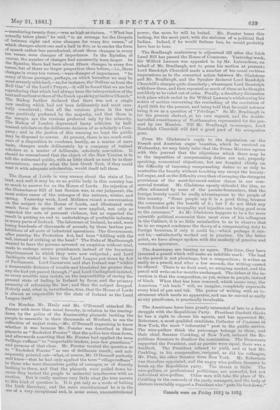The House of Lords is very uneasy about the state
of Ire- land, and well it may be, as no public body in this country has 10 much to answer for as the House of Lords. Its rejection of the Disturbance Bill of last Session was, in our judgment, the most active cause of the outrages of the autumn, winter, and spring. Yesterday week, Lord Midleton raised a conversation on the subject in the House of Lords, and illustrated with much 'force the system of terror now applied, not only as regarded the acts of personal violence, but as regarded the result in putting an end to undertakings of profitable industry in many parts of Ireland. The labourers of Ireland, he said, were losing hundreds of thousands of pounds, by those lawless pro- hibitions of all sorts of industrial operations. The Government, after passing the Protection Act, had been "fiddling with the tail, instead of striking at the head." The Duke of Marlborough wanted to have the persons arrested on suspicion without trial, made to undergo severe punishment, instead of the luxurious imprisonment to which they were now subjected ; and Lord Inchiquin wished to have the Land League put down by Act -of Parliament. Lord Carnarvon said that Ireland was "within a measurable distance of trouble and bloodshed far greater than any she had yet passed through ;" and Lord Carlingford insisted, as every sensible man insists, on the impossibility of curing the present state of feeling in Ireland by force, and the primary necessity of reforming the law ; and then the subject dropped. Nobody said, what is, nevertheless, true, that the House of Lords is almost as responsible for the state of Ireland as the Land League itself.


































 Previous page
Previous page